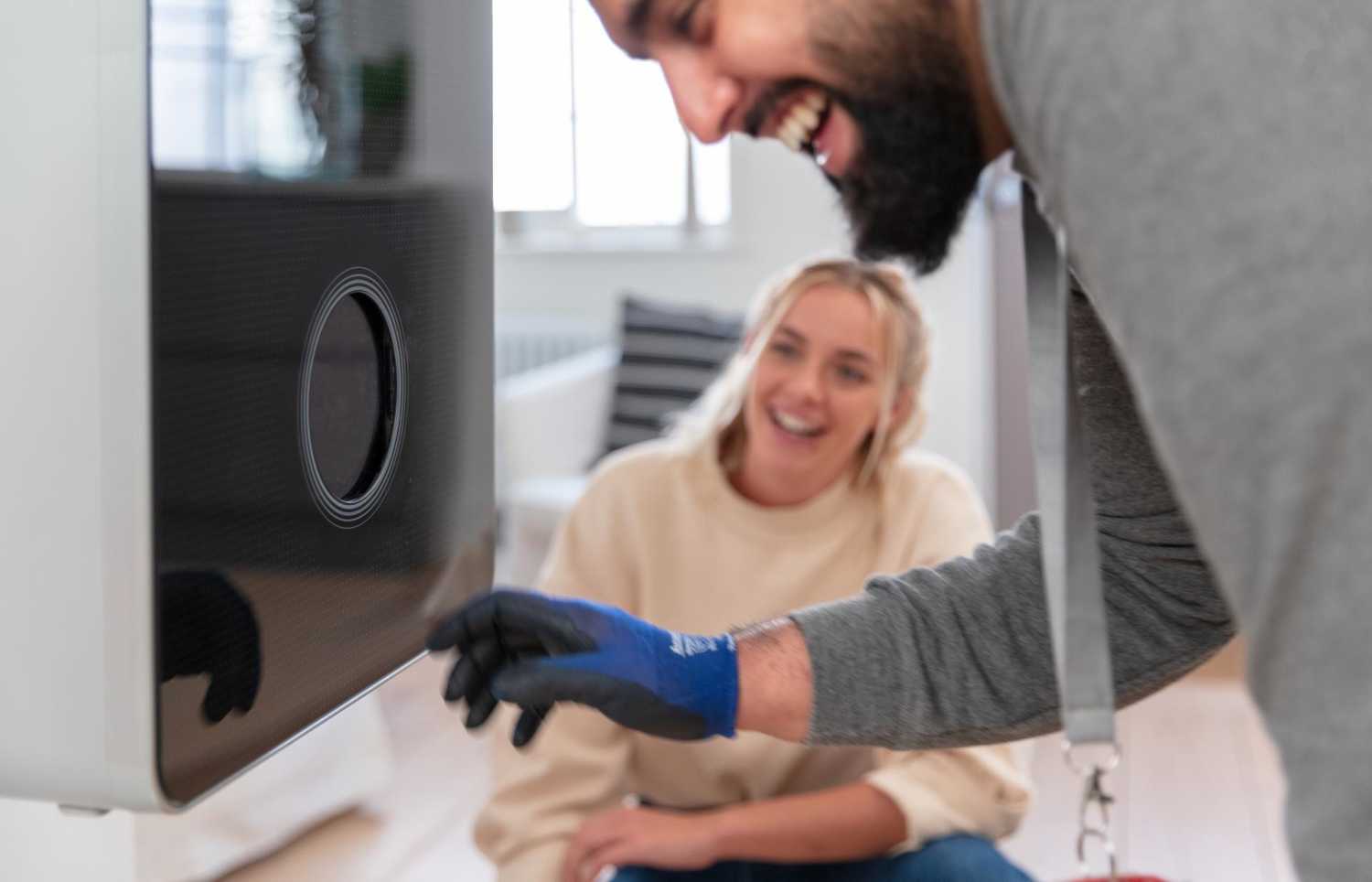Installing renewable and sustainable energy solutions at home can cut your energy bills and your carbon footprint. Here’s my advice for getting started.
Key takeaways
- Renewable technologies use natural sources – like the sun, air, wind and water – to create energy
- When used in your home to generate electricity, heating or cooling, they reduce your reliance on fossil fuels and can bring your bills down by hundreds of pounds each year
- There are other ways to make your home and lifestyle more sustainable, like electric vehicle (EV) charging and more efficient gas boilers.
With the ongoing climate crisis, we’re all aware that we need to take action for climate and be more sustainable in our everyday lives. The need to save energy and to lower our energy bills is only adding to our desire to become more sustainable.
The whole country is now working towards net-zero carbon emissions by 2050, whether that’s phasing out our reliance on fossil-fuelled energy generation and old gas boilers or replacing petrol and diesel cars with electric vehicles.
At E.ON, we’re playing a key part in driving the UK’s sustainable revolution and making it easier for people to make energy efficiency and renewable improvements in and around their homes.
This ranges from more efficient gas boilers and energy-saving advice to solar panels, heat pumps and electric vehicle chargers.
Here’s our guide to bringing renewable technologies and sustainable solutions into your home.
In this guide:
- What are renewable energy solutions?
- What are the benefits of renewable solutions in your home?
- Types of renewable solutions for your home
- Other ways to make your home and lifestyle more sustainable
- Financial support to help fund renewable energy solutions
- How to start making your home more sustainable
What are renewable energy solutions?
Renewable solutions are energy technologies that can be installed in your home to generate and store renewable energy.
They create energy from infinite, natural resources like the sun, wind, air, water and biomass. Examples are solar photovoltaic (PV) panels and air source heat pumps.
What are the benefits of renewable solutions in your home?
Like any form of sustainable living, renewable solutions benefit both you and the environment. They help you to avoid using fossil fuels, to use energy more efficiently and to save money on your energy bills.
With the UK committing to carbon neutrality by 2050, bringing renewable energy solutions into your home is a great way to join the fight against climate change.
The key benefits of renewable energy solutions are:
- Saving money on your energy bills while making your home comfortable and energy efficient
- Improving your health from having a more efficient, properly insulated and warmer home
- Lowering your carbon emissions and hence your carbon footprint
Types of renewable solutions for your home
Solar panels and battery storage
You can generate your own cleaner electricity with solar panels and store this energy with solar battery storage.
The solar panels convert the sun’s energy into electricity that you can use to power your home, appliances and devices. The battery lets you store this electricity and use it at night or whenever is most convenient for you.
It doesn’t have to be sunny for solar panels to generate electricity during daylight hours, but panels will generate more on sunnier days. And any excess power you don’t use can be sold into the national electricity grid as part of the Government’s Smart Export Guarantee (SEG).
Solar energy can also be used to provide hot water and heating all year round. The power they generate heats water in a hot water cylinder.
Air source heat pumps
If your boiler is due an upgrade, consider opting for an air source heat pumpinstead.
Heat pumps reduce your reliance on gas to heat your home and can help lower your energy costs.
Air source heat pumps work by absorbing the ambient air from outside which causes a refrigerant liquid in the heat pump to boil and turn to gas. This gas is then compressed by the heat pump and the warmth it creates is used to heat your home and provide hot water.
Other ways to make your home and lifestyle more sustainable
As well as renewable energy generation, you can also make your home and lifestyle more sustainable by considering a more efficient gas boiler or, if you drive an electric vehicle, getting an at-home charger.
More efficient boilers
As we move towards zero and low carbon energy solutions, there’s still the opportunity to reduce usage through more efficient boilers if getting an air source heat pump is not possible.
Older boilers (typically 10-15 years old) don’t heat your home as efficiently as they could and so use more energy to run.
Installing a new A-rated energy efficient gas boiler will mean that you’re using less gas or oil to heat your home than with an older boiler.

Electric vehicle chargers
The sale of new conventional petrol and diesel cars and vans will be banned in the UK from 2030. Going forward, the only new vehicles being sold will be electric vehicles (and hybrids until 2035).
Electric motors are much more efficient than petrol and diesel cars because they don’t need a gearbox: they convert over 77% of the energy they use to motion, while petrol vehicles convert less than 30%. By investing in an electric car or van, you’ll help to reduce air pollution and cut your carbon footprint.
Charging your car or van at home is the most common place to charge, so getting an electric vehicle charger fitted to your home makes sense.
Financial support to help fund renewable energy solutions
Making your home more energy efficient can be an expensive outlay.
That’s why we’re helping our customers access grants and funding to make energy efficient home improvements and renewable solutions more affordable.
We’re involved with Green Funding schemes such as:
- Local Authority Delivery (LAD)
- Home Upgrade Grant (HUG)
- Social Housing Decarbonisation Fund (SHDF)
- Boiler Upgrade Scheme, which offers £5-6k towards an air source heat pump installation
- Homes for Living (free mobility aids)
The Energy Company Obligation (ECO)
The Energy Company Obligation or ‘ECO’, is a domestic energy efficiency funding programme directed by the government and delivered through the Green Levy by energy companies, such as E.ON.
ECO4 which will run from April 2022 to March 2026 with £1 billion per annum worth of funding available to eligible households.
ECO’s main goals are supporting low-income households to reduce fuel poverty and to improve energy efficiency in communities.
Find out about energy efficiency grants and funding on the E.ON website.
How to start making your home more sustainable
To get the most out of any investment you’re planning to make in renewable technologies, I recommend making sure your home is as energy efficient as it can be first.
It’s also a good idea to get your energy from a supplier that provides 100% renewables-backed electricity (like E.ON Next).
Getting a smart meter installed means you’ll get a better understanding of your energy usage. Your in-home display unit will show you when and where you’re using energy.
By better understanding how much energy you’re using and what you’re spending in pounds and pence, you can see where you could improve or cut your energy usage.
It’s also a good reminder to turn off the lights and heating when not at home.
And there’s no point in generating your own cleaner energy if heat is simply escaping out of your walls and loft. Look at adding insulation and other energy efficiency measures to your home, such as draught-proofing and smart thermostats.
Then start to consider which renewable solutions are right for you and your home. Remember to check to see if you’re eligible for any government grants for the measures you want to install.
Sustainability is key in the fight against climate change and there’s so much you can do to lead a more sustainable life.
Find more sustainable living ideas on the E.ON website.

